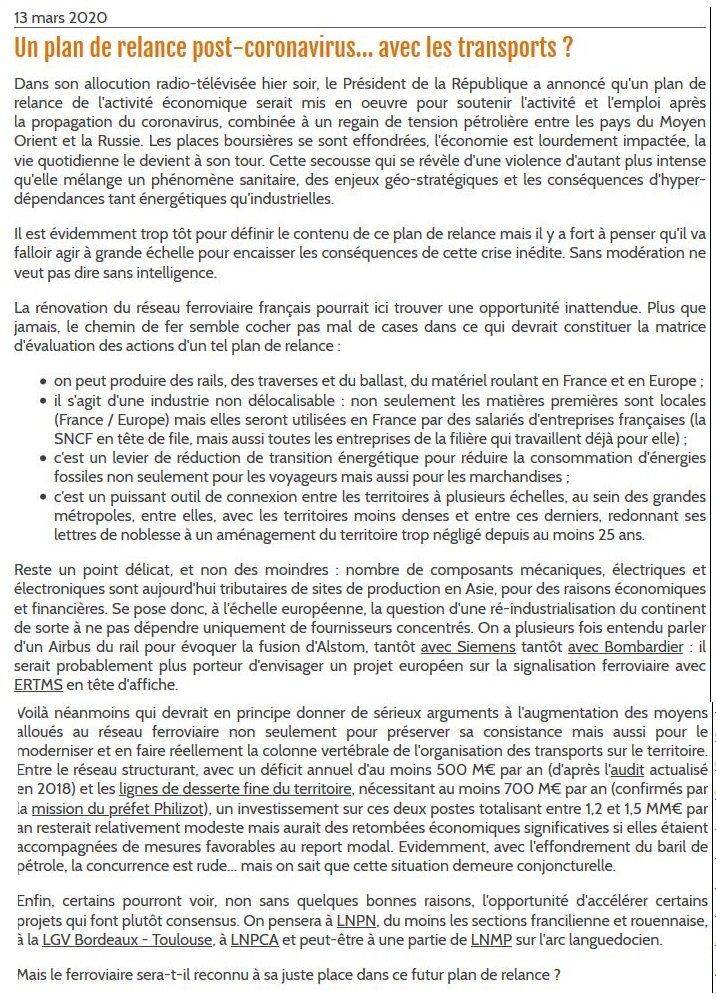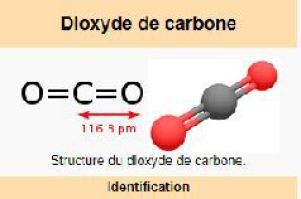Intéressant:
Consultez "https://www.earthwake.fr/"
To think about...
Producing one tonne of hydrogen from fossil gas results in the emission of between 11 and 13 tonnes of CO2.
MEDIAWORLD
THE RAIL FREIGHT SECTOR MUST BE DECLARED TO BE OF VITAL INTEREST
As the spread of Covid-19 accelerates and the country is placed in lockdown, the government reaffirms its desire to maintain the supply chain and announces measures to support the activity of transport and logistics professionals.
THE RAIL FREIGHT SECTOR MUST BE DECLARED TO BE OF VITAL INTEREST
The rail freight sector, mobilized since the start of the epidemic crisis to maintain its activity, is fully in line with this approach and welcomes the exceptional measures announced for all transport and logistics professionals to guarantee the continuity of transport operations.
However, rail freight activity is vital to ensure the supply of businesses and the population. For example, it allows the mass transport of fuel, the circulation of swap bodies at night, the refrigerated transport of products intended for large-scale distribution, or cereals for the manufacture of flour and bread.
It must also be declared to be of vital interest by the government. In this context, it requires the implementation of specific safeguard measures such as the maintenance of nighttime traffic by SNCF Réseau, the provision of rooms for drivers resting outside their residence, and the provision of means of protection to ensure the health safety of personnel of rail freight companies.
Furthermore, it is imperative that everything possible is done to ensure that cross-border rail freight activity can continue safely.
"In the unprecedented crisis we are experiencing, rail freight activity is strategic to avoid a disruption in the supply chain of companies. The government must immediately adopt concrete safeguard measures in favor of companies engaged in rail freight, to ensure continuity of service," says Pascal SAINSON, President of the AFRA Freight Commission.
About AFRA
The French Rail Association (AFRA), created in March 2009, brings together alternative operators to the SNCF: Transdev, Transdev Rail, Trenitalia / Thello, Deutsche Bahn / Arriva, active in passenger transport; Colas Rail, ETF Services, Euro Cargo Rail, Europorte (Getlink group), ETMF, LINEAS, RegioRail, T3M, Froidcombi, companies specializing in rail freight and combined transport; Vossloh, manufacturer of railway equipment, Objectif OFP, Moreno and Akiem
As the spread of Covid-19 accelerates and the country is placed in lockdown, the government reaffirms its desire to maintain the supply chain and announces measures to support the activity of transport and logistics professionals.
THE RAIL FREIGHT SECTOR MUST BE DECLARED TO BE OF VITAL INTEREST
The rail freight sector, mobilized since the start of the epidemic crisis to maintain its activity, is fully in line with this approach and welcomes the exceptional measures announced for all transport and logistics professionals to guarantee the continuity of transport operations.
However, rail freight activity is vital to ensure the supply of businesses and the population. For example, it allows the mass transport of fuel, the circulation of swap bodies at night, the refrigerated transport of products intended for large-scale distribution, or cereals for the manufacture of flour and bread.
It must also be declared to be of vital interest by the government. In this context, it requires the implementation of specific safeguard measures such as the maintenance of nighttime traffic by SNCF Réseau, the provision of rooms for drivers resting outside their residence, and the provision of means of protection to ensure the health safety of personnel of rail freight companies.
Furthermore, it is imperative that everything possible is done to ensure that cross-border rail freight activity can continue safely.
"In the unprecedented crisis we are experiencing, rail freight activity is strategic to avoid a disruption in the supply chain of companies. The government must immediately adopt concrete safeguard measures in favor of companies engaged in rail freight, to ensure continuity of service," says Pascal SAINSON, President of the AFRA Freight Commission.
About AFRA
The French Rail Association (AFRA), created in March 2009, brings together alternative operators to the SNCF: Transdev, Transdev Rail, Trenitalia / Thello, Deutsche Bahn / Arriva, active in passenger transport; Colas Rail, ETF Services, Euro Cargo Rail, Europorte (Getlink group), ETMF, LINEAS, RegioRail, T3M, Froidcombi, companies specializing in rail freight and combined transport; Vossloh, manufacturer of railway equipment, Objectif OFP, Moreno and Akiem
We cannot resist presenting the remarkable article taken from Transportrail, a web magazine of very high quality:
What solutions for the energy supply of the future?
Our think tank is convinced that using hydrogen or electricity is not the best solution to solve the problem of renewing transport energy.
Alternatrain is very interested in the subject and recommends paying the greatest attention to the work of Marc ROBERT and Julien BONIN, researchers at the CNRS.
Read below a very interesting summary document from the BATIACTU site from July 2017.
DISCOVERY. Recycling carbon dioxide into methane using a simple chemical reaction is a scientist's dream that two researchers from Paris Diderot University have made a reality. Laboratory results that pave the way for a circular use of CO2, and therefore a solution for managing this greenhouse gas.
This may be the Holy Grail of ecological transition that has just been revealed by two French researchers from the CNRS: Marc Robert and Julien Bonin have developed a process capable of transforming carbon dioxide (CO2), a greenhouse gas currently considered waste, into methane (CH4), a concentrated energy source and the main component of natural gas. And this method, published in the journal Nature, does not use expensive catalysts based on rare or precious metals, nor does it require large quantities of energy. It simply consists of using a catalyst based on iron, an abundant and inexpensive metal, and letting... natural light do the work.
A "SOLAR FUEL"
Like artificial photosynthesis, the sole contribution of solar energy allows a chemical transformation process to be initiated. During the latter, the CO2 molecule gradually loses its two oxygen atoms, which are replaced by hydrogen atoms. In the process, energy is stored in the form of chemical bonds (four CH bonds compared to two C=O bonds originally). A reduction reaction that allows a quantity of different compounds to be obtained, ranging from carbon monoxide (CO) and formic acid (CH2O2), useful as raw materials in industry, to methanol (CH3OH) and then methane (CH4), two fuels. The icing on the cake is that the catalytic process operates at room temperature and pressure.
It is therefore not a question of eliminating the CO2 present in the atmosphere, since the use of fuels as an energy source will release exactly the same quantity of carbon dioxide as that used to obtain them. But rather of considering a real sustainable carbon cycle, like what is done with wood energy where the material fixes carbon during the growth period before releasing it during its degradation. According to the Molecular Electrochemistry laboratory, the combination of solar radiation and the iron-based catalyst to transform CO2 into a molecule with a high energy content "shows that it is possible to store renewable solar energy in the form of fuel compatible with industrial infrastructures and existing energy networks". Enough to supplant methanation and all battery electricity storage systems?






